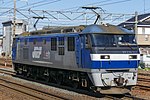JNR Class EF57
This article relies largely or entirely on a single source. (July 2016) |
| Class EF57 | |||||||||||||||||||||||||||
|---|---|---|---|---|---|---|---|---|---|---|---|---|---|---|---|---|---|---|---|---|---|---|---|---|---|---|---|
 EF57 9 at Shinjuku Station in 1975 | |||||||||||||||||||||||||||
| |||||||||||||||||||||||||||
| |||||||||||||||||||||||||||
| |||||||||||||||||||||||||||
| |||||||||||||||||||||||||||
The Class EF57 (EF57形) of 2-C+C-2 wheel arrangement DC electric locomotives was a development of the previous JNR Class EF56. 15 Class EF57s were built between 1939 and 1943 by Hitachi and Kawasaki.
Introduced on Tokaido Line passenger services, they were seen at the head of expresses such as the Tsubame, complete with train headboard mounted precariously on the front of the cab decks. With the introduction of the newer semi-streamlined Class EF58s on Tokaido Line services, the EF57s were transferred to the Tohoku Main Line. At the same time, their steam-heating boilers were removed and replaced by electric-heating generators.
The class remained in use on long-distance express trains on the Tohoku Main Line until the 1970s.
Preserved examples
[edit]
Only one member of the class is preserved: EF57 7 in a park in Utsunomiya, Tochigi Prefecture.
See also
[edit]References
[edit]- Inoue, Kōichi (1999). 国鉄機関車事典: 蒸気・電気・ディーゼル機関車66形式 国鉄機関車辞典 [JNR Locomotive Encyclopedia] (in Japanese). Japan: Sankaido. pp. 96–97. ISBN 978-4-381-10338-3.

